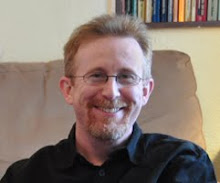Five weeks into living at our new address in Tampa. When I woke up about 2:30 Saturday morning, I thought I heard an explosion. Since I was sound asleep, I assumed I imagined the noise. We live near a fairly trendy bar/restaurant district, so when I heard a man yelling a few seconds later, I thought it was someone straggling home and being stupid. Even when I looked out the blinds into the street, I couldn't see anything unusual.
When I heard car doors and voices a few minutes later, I looked out the window again. Police officers walked up and down the street, police tape was put up to block traffic and that odd-looking trash in the middle of the street was marked as evidence - they were shell casings. The officer who came to the door told me that one of our neighbors (we live in a triplex) had been attacked and had shot the assailant.
To our knowledge, it was the first act of violence in the neighborhood since we moved here. We were shocked at the initial event and we remain uneasy. Julie and I have both walked around the area extensively, during the day and at night, and saw no reason to be concerned. Should we be now?
In 1992 I lived in Palo Alto, California, in San Joaquin County. The next door community of East Palo Alto, in San Mateo County, was the "murder capital of the nation" that year. The few times I went to East Palo Alto it was dramatically different from most of the rest of the San Francisco Bay Area; roads were crumbled, houses and businesses had bars over the windows. I didn't feel in any particular danger, but I didn't linger. Housing prices in surrounding communities rose so high that East Palo Alto became the only option for a lot of people. In only a few years, major retailers started moving in, a bank opened an ATM (no bank had trusted East Palo Alto with an ATM prior to that), and housing prices doubled. I haven't been there in many years, but I understand crime rates are down and some degree of gentrification has occurred. I realize many people (including myself) have mixed feelings about gentrification and its impact on diversity. But there is no doubt that East Palo Alto today is a changed city from what I saw in the early 1990s.
We remain optimistic about our own neighborhood, trying to view the violence in our street as an isolated incident. But it got me thinking about the pace of local change. At what point can we recognize change at the neighborhood or city level? As with a recession, it seems we are well into the event before we identify it. Often the events we expect to cause the greatest change - for example, a transition of mayors or city council members - bring little recognizable change at all. The question applies at higher levels, also. For example, the United States after 9/11: Was the world really a different place on September 12, 2001, or was it only Americans' perceptions of the world that changed? And to what extent did those new perceptions result in further global change?
New Orleans provides an example of how a dramatic event, Hurricane Katrina, did not so much cause change as exacerbate change that was already in progress, from a SeedMagazine.com article on Urban Resilience:
"In New Orleans, for example, more than 60 percent of wetlands have been lost in the last 60 years, due partly to oil and natural gas exploration and partly to the levies that were built to keep the Mississippi from flooding the city. Ironically, the loss of these wetlands contributed very directly to the disastrous effects of Hurricane Katrina. Researchers have since calculated that restoring 1 kilometer of wetland would reduce the wave height by one meter, and now efforts are underway to begin rebuilding the southern Louisiana coastline."So what we perceive as change sometimes is just the result of change that occurred while we weren't paying attention. Or, it may be a result of change that happened elsewhere; change in East Palo Alto was driven in part by the rising cost of living in surrounding cities.
I didn't really get back to sleep that morning after the shooting. By about 5 A.M., I could hear birds outside singing, just like they do every morning. When we left the apartment later to run errands, the only visible evidence of the horrible event was a section of police tape left on a telephone pole. Otherwise, the neighborhood was quiet and looked exactly as it has every other Saturday morning. People walked their dogs and went about their day. Emotional shock waves were the only evidence that an exceptional event ever took place. On some future day, maybe that will pass, too.




